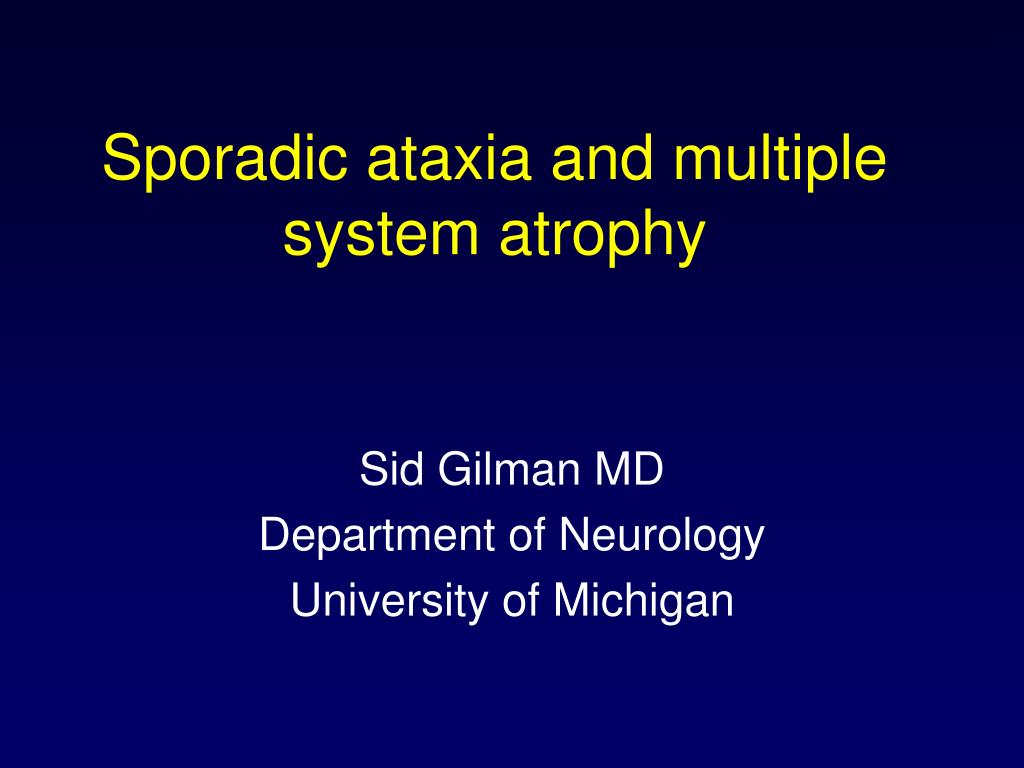Sporadic Ataxia Investigation
Sporadic ataxia is a term designating a group of diseases of the central nervous system that occur without evidence that they are inherited that is no other person in the affected individuals family has ever had the same disorder. Ataxia can also be acquired.

The Frequency And Causes Of Non Familial Ataxia Download Table
The MR scan usually shows cere-.

Sporadic ataxia investigation. Of progression of ataxia. Rapidly progressive ataxia warrants urgent investigation particularly to exclude underlying malignancy. While it is rarely diagnostic it often provides helpful diagnostic clues as well as ruling out structural pathology table 2.
It can also be used as a rehabilitation index of gait status and ADL independence in ataxic stroke patients. To assist investigators in the early or pilot phase of their studies relevant to the cause pathogenesis or treatment of the hereditary or sporadic ataxias. It results from pathology in the cerebellum and its connections or in the proprioceptive sensory pathways.
Listing a study does not mean it has been evaluated by the US. We classified ataxia as hereditary sporadic or unknown. The diagnostic approach to adult onset ataxias should be systematic and guided by the history and examination.
We prospectively investigated 400 patients with progressive ataxia and identified a group of patients with idiopathic sporadic ataxia. In ataxia disorders studies on prevalen ce consequences and prognostic implications of dysphagia are scarce. SARA is a clinical scale that is based on a semi-quantitative assessment of cerebellar ataxia spinocerebellar Friedreichs and sporadic ataxia on an impairment level.
Serum levels of anti-gliadin anti-transglutaminase 2 TG2 and anti-transglutaminase 6 TG6 antibodies measured in 125 patients with ataxia 100 patients with. The majority of pedigrees with autosomal dominant cerebellar ataxia ADCA harbour a pathological expansion of a trinucleotide repeat at one of five genetic loci. Sporadic ataxias can also occur in families with no prior history.
Patients suffering from hereditary ataxia had either positive genetic testing or a family member with genetically confirmed hereditary ataxia or strong clinical suspicion of hereditary ataxia based. The etiology of sporadic adult-onset ataxia in the majority of cases is unexplained. Conditions that can cause acquired ataxia include stroke multiple sclerosis tumors alcoholism peripheral neuropathy metabolic disorders and vitamin deficiencies.
Mitochondrial DNA mtDNA. In many patients with sporadic adult-onset ataxia a specific acquired or genetic cause cannot be found suggesting a diagnosis of sporadic degenerative ataxia. Cerebellar ataxia arises from different etiologies classified as hereditary or sporadic.
A positive familial history signals a genetic disorder. Among the differential diagnosis of ataxia published in various reports as well as review articles SS of CNS is not included as one of. Immunity may be an under-recognised and potentially reversible cause of progressive ataxia.
ILOCA is a diagnosis of exclusion. Sporadic Ataxia and Multiple System Atrophy MSA What is sporadic ataxia. Among the sporadic degenerative ataxias the cerebellar variant of multiple system atrophy MSA is a pathologically and.
Toxic causes immune-mediated ataxias vitamin deficiency infectious diseases degenerative disorders and even genetic. Neurodegenerative disorders that affect motor control. Mismatch repair-deficient MMRD brain tumors are rare among primary brain tumors and can be induced by germline or sporadic mutations.
Natural History Study SPORTAX-NHS The safety and scientific validity of this study is the responsibility of the study sponsor and investigators. Spinocerebellar ataxia SCA 1 2 3 6 and 71 Other loci have been associated with ADCA in a limited number of families13 but in a significant number of pedigrees the genetic basis remains uncertain. Investigation Brain imaging with MRI or CT if MRI is contrain-dicated is essential in almost everyone with ataxia.
Therefore clinical exome sequencing is an. The term refers to changes. To investigate the prevalence of gluten ataxia among patients with ataxia in China.
Next-generation sequencing is enabling many more idiopathic ataxias to be given a genetic cause. A comparison of the prevalence of autoimmune diseases the autoimmunity linked HLA DQ2 and serum anticerebellar antibodies was made between patients with idiopathic sporadic and those with genetically characterized ataxia. There are several disease categories that may manifest with sporadic ataxia.
The list of causes of ataxia is extensive. Non-genetic ataxias may involve an extensive and expensive evaluation that may be done in a tiered fashion. Motor symptoms in HD are typically related to chorea and occasionally parkinsonism myoclonus and dystonia.
Recent evidence suggests that ataxia may be the only manifestation of GS and that it may be one of the causes of sporadic ataxia. Ataxia is a neurological syndrome characterised by clumsy and unco-ordinated movement of the limbs trunk and cranial muscles. Non-choreiform movements such as.
Hereditary and sporadic ataxias. Documentation of other nervous system involvement particularly basal ganglia and autonomic dysfunction is critical for the diagnosis of MSA-C in patients with sporadic ataxia Case 9-2. Sporadic Degenerative Ataxia With Adult Onset.
This study demonstrated that clinical exome sequencing in patients with adult-onset and sporadic presentations of ataxia is a high-yield test providing a definitive diagnosis in more than one-fifth of patients and suggesting a potential diagnosis in more than one-third to guide additional phenotyping and diagnostic evaluation. In a case series pub-lished by Abele et al it was shown that only in 42 of patients the cause was known2. Ataxia Research Grant.
MSA-C is the most common sporadic ataxia. For older patients presenting with sporadic degenerative ataxia neurologists should consider the diagnosis of multiple system atrophycerebellar type MSA-C. MRI of the brain may provide a clue to the diagnosis of.
To describe a unique case of a woman who presented as a progressive cerebellar ataxia with no family history of neurological diseases that after extensive investigation was diagnosed as Huntingtons Disease HD.

Ppt Sporadic Ataxia And Multiple System Atrophy Powerpoint Presentation Id 139677

Pdf Diagnosis And Management Of Progressive Ataxia In Adults

Comparison Between Sporadic Idiopathic And Genetically Characterised Download Table